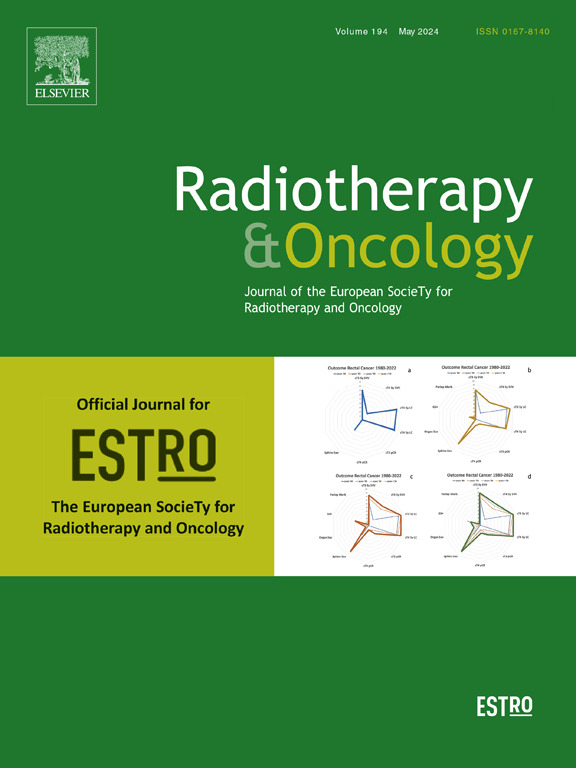Re-irradiation in patients affected by prostate cancer and relapsing after previous definitive or postoperative radiotherapy. An international registry based study on behalf of Italian association of radiotherapy and clinical oncology (AIRO). (RE-START)
IF 5.3
1区 医学
Q1 ONCOLOGY
引用次数: 0
Abstract
Background
Aiming to evaluate the long-term safety of re-irradiation approaches, the Italian Association for Radiotherapy and Clinical Oncology Oncology (AIRO) re-irradiation study group proposed the institution of a multicentric registry including prostate cancer patients undergoing re-irradiation for local relapse after postoperative or definitive RT.
Materials and methods
RESTART is an observational longitudinal study including patients with biochemical relapse according to EAU criteria after a previous course of definitive or postoperative RT, and treated for a macroscopic recurrence within the prostate or prostate bed visualized on PET-CT or magnetic resonance imaging (MRI). Patients were treated with stereotactic body radiotherapy (SBRT) or brachytherapy (BT), with fraction doses of at least 5 Gy for EBRT, and no other restrictions regarding fractionation schedule or total dose. Exclusion criteria consisted of the presence of regional nodal disease or distant metastases, persisting severe toxicities from previous RT or follow-up shorter than 6 months.
Results
Four hundred and thirty-three patients from 5 centers were included in the current analysis. Overall, 64.2 % and 90.3 % of patients did not report any acuteGU or GI toxicity. No treatment-related deaths were registered. LateG2 or G3 GU toxicity was reported in 16.2 and 4.8 % of patients, respectively. After a median follow-up of 54 months (95 % CI 26–78), 239 biochemical recurrences (55.2 %), 119 radiologically-confirmed regional or distant relapses (27.2 %), and 95 deaths (21.9 %) were recorded, respectively.
Conclusion
Results confirm the safety, feasibility, and efficacy of re-irradiation for prostate cancer, and provide insights about features associated with improved oncological outcomes after treatment.
前列腺癌患者既往明确放疗或术后放疗后复发的再放疗。代表意大利放射治疗和临床肿瘤协会(AIRO)进行的一项基于国际注册的研究。(重启)。
背景:为了评估再照射方法的长期安全性,意大利放射治疗和临床肿瘤协会(AIRO)再照射研究组提出了一个多中心登记制度,包括前列腺癌术后或终末期放射治疗后局部复发而接受再照射的患者。RESTART是一项纵向观察性研究,研究对象包括在先前的终端性或术后RT治疗后,根据EAU标准出现生化复发的患者,并在PET-CT或磁共振成像(MRI)上观察到前列腺或前列腺床内的宏观复发。患者接受立体定向体放疗(SBRT)或近距离放疗(BT), EBRT的分次剂量至少为5 Gy,没有其他分次计划或总剂量的限制。排除标准包括存在区域性淋巴结疾病或远处转移,既往RT持续存在严重毒性或随访时间短于6 个月。结果:来自5个中心的433名患者被纳入当前的分析。总体而言,64.2 %和90.3 %的患者没有报告任何急性gu或GI毒性。没有与治疗相关的死亡登记。分别有16.2%和4.8% %的患者报告了LateG2或G3 GU毒性。中位随访54 个月后(95% % CI 26-78),分别记录了239例生化复发(55.2% %)、119例放射学证实的局部或远处复发(27.2% %)和95例死亡(21.9% %)。结论:研究结果证实了前列腺癌再照射治疗的安全性、可行性和有效性,并对治疗后肿瘤预后改善的相关特征提供了见解。
本文章由计算机程序翻译,如有差异,请以英文原文为准。
求助全文
约1分钟内获得全文
求助全文
来源期刊

Radiotherapy and Oncology
医学-核医学
CiteScore
10.30
自引率
10.50%
发文量
2445
审稿时长
45 days
期刊介绍:
Radiotherapy and Oncology publishes papers describing original research as well as review articles. It covers areas of interest relating to radiation oncology. This includes: clinical radiotherapy, combined modality treatment, translational studies, epidemiological outcomes, imaging, dosimetry, and radiation therapy planning, experimental work in radiobiology, chemobiology, hyperthermia and tumour biology, as well as data science in radiation oncology and physics aspects relevant to oncology.Papers on more general aspects of interest to the radiation oncologist including chemotherapy, surgery and immunology are also published.
 求助内容:
求助内容: 应助结果提醒方式:
应助结果提醒方式:


